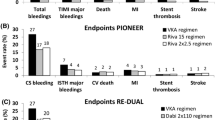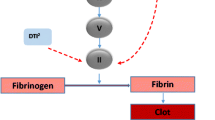Abstract
Background
Approximately 5 to 7% of patients undergoing percutaneous coronary intervention (PCI) for the treatment of coronary artery disease require chronic oral anticoagulation (OAC) on top of aspirin and a P2Y12 receptor antagonist, mainly due to non-valvular atrial fibrillation (AF). The advent of non-vitamin K antagonist oral anticoagulants (NOACs) increased treatment options, while there is cumulative evidence that dual combination of a NOAC and a P2Y12 receptor antagonist attenuates risk of bleeding, compared to traditional triple therapy, consisting of a vitamin K antagonist (VKA), aspirin, and a P2Y12 receptor antagonist, without significantly compromising efficacy.
Study Design
Greek AntiPlatElet Atrial Fibrillation (GRAPE-AF, NCT 03362788) is an observational, nationwide study of non-valvular AF patients undergoing PCI, planning to enroll over 1-year period > 500 participants in 25 tertiary and non-tertiary PCI centers in Greece. Key data to be collected pre-discharge include demographics, detailed past medical history, and antithrombotic and concomitant treatment. Patients will be followed up at 1, 6, and 12 months post hospital discharge. Αt each follow-up visit, data on antithrombotic treatment, ischemic, bleeding, and adverse events will be collected. Study’s primary endpoint is clinically significant bleeding (Bleeding Academic Research Consortium, BARC ≥ 2) at 12 months, between VKAs and NOACs-treated patients, analyzed using Cox proportional hazards models, by an intention-to-treat principle. An independent endpoint committee will adjudicate all clinical events.
Conclusions
This study aims at providing “real-world” information on current antithrombotic treatment patterns and clinical outcome of patients with non-valvular AF undergoing PCI.
Similar content being viewed by others
References
Rossini R, Musumeci G, Lettieri C, Molfese M, Mihalcsik L, Mantovani P, et al. Long-term outcomes in patients undergoing coronary stenting on dual oral antiplatelet treatment requiring oral anticoagulant therapy. Am J Cardiol. 2008;102(12):1618–23.
Rubboli A, Colletta M, Valencia J, Capecchi A, Franco N, Zanolla L, et al. Periprocedural management and in-hospital outcome of patients with indication for oral anticoagulation undergoing coronary artery stenting. J Interv Cardiol.
Choi HI, Ahn JM, Kang SH, Lee PH, Kang SJ, Lee SW, et al. Prevalence, management, and long-term (6-year) outcomes of atrial fibrillation among patients receiving drug-eluting coronary stents. JACC Cardiovasc Interv.
Lopes RD, Pieper KS, Horton JR, Al-Khatib SM, Newby LK, Mehta RH, et al. Short- and long-term outcomes following atrial fibrillation in patients with acute coronary syndromes with or without ST-segment elevation. Heart. 2008;94(7):867–73.
Rene AG, Genereux P, Ezekowitz M, Kirtane AJ, Xu K, Mehran R, et al. Impact of atrial fibrillation in patients with ST-elevation myocardial infarction treated with percutaneous coronary intervention (from the HORIZONS-AMI [harmonizing outcomes with revascularization and stents in acute myocardial infarction] trial). Am J Cardiol. 2014;113(2):236–42.
Alexopoulos D, Vlachakis P, Lekakis J. Triple antithrombotic therapy in atrial fibrillation patients undergoing PCI: a fading role. Cardiovasc Drugs Ther. 2017;31(3):319–24.
Agarwal N, Jain A, Mahmoud AN, Bishnoi R, Golwala H, Karimi A, et al. Safety and efficacy of dual versus triple antithrombotic therapy in patients undergoing percutaneous coronary intervention. Am J Med. 2017;130(11):1280–9.
Zhu W, Guo L, Liu F, Wan R, Shen Y, Lip GYH, et al. Efficacy and safety of triple versus dual antithrombotic therapy in atrial fibrillation and ischemic heart disease: a systematic review and meta-analysis. Oncotarget. 2017;8(46):81154–66.
Connolly SJ, Ezekowitz MD, Yusuf S, Eikelboom J, Oldgren J, Parekh A, et al. Dabigatran versus warfarin in patients with atrial fibrillation. N Engl J Med. 2009;361(12):1139–51.
Patel MR, Mahaffey KW, Garg J, Pan G, Singer DE, Hacke W, et al. Rivaroxaban versus warfarin in nonvalvular atrial fibrillation. N Engl J Med. 2011;365(10):883–91.
Granger CB, Alexander JH, McMurray JJ, Lopes RD, Hylek EM, Hanna M, et al. Apixaban versus warfarin in patients with atrial fibrillation. N Engl J Med. 2011;365(11):981–92.
Giugliano RP, Ruff CT, Braunwald E, Murphy SA, Wiviott SD, Halperin JL, et al. Edoxaban versus warfarin in patients with atrial fibrillation. N Engl J Med. 2013;369(22):2093–104.
Gibson CM, Mehran R, Bode C, Halperin J, Verheugt FW, Wildgoose P, et al. Prevention of bleeding in patients with atrial fibrillation undergoing PCI. N Engl J Med. 2016;375(25):2423–34.
Cannon CP, Bhatt DL, Oldgren J, Lip GYH, Ellis SG, Kimura T, et al. Dual antithrombotic therapy with dabigatran after PCI in atrial fibrillation. N Engl J Med. 2017;377(16):1513–24.
Angiolillo DJ, Fernandez-Ortiz A, Bernardo E, Alfonso F, Macaya C, Bass TA, et al. Variability in individual responsiveness to clopidogrel: clinical implications, management, and future perspectives. J Am Coll Cardiol. 2007;49(14):1505–16.
Stone GW, Witzenbichler B, Weisz G, Rinaldi MJ, Neumann FJ, Metzger DC, et al. Platelet reactivity and clinical outcomes after coronary artery implantation of drug-eluting stents (ADAPT-DES): a prospective multicentre registry study. Lancet. 2013;382(9892):614–23.
Bhatt DL. O PIONEERs! The beginning of the end of full-dose triple therapy with warfarin? Circulation. 2017;135(4):334–7.
Kirchhof P, Benussi S, Kotecha D, Ahlsson A, Atar D, Casadei B, et al. 2016 ESC guidelines for the management of atrial fibrillation developed in collaboration with EACTS. Eur Heart J. 2016;37(38):2893–962.
Macle L, Cairns J, Leblanc K, Tsang T, Skanes A, Cox JL, et al. 2016 Focused update of the canadian cardiovascular society guidelines for the management of atrial fibrillation. Can J Cardiol. 2016;32(10):1170–85.
Levine GN, Bates ER, Bittl JA, Brindis RG, Fihn SD, Fleisher LA, et al. 2016 ACC/AHA guideline focused update on duration of dual antiplatelet therapy in patients with coronary artery disease: a report of the American College of Cardiology/American Heart Association Task Force on Clinical Practice Guidelines. J Am Coll Cardiol. 2016;68(10):1082–115.
Valgimigli M, Bueno H, Byrne RA, Collet JP, Costa F, Jeppsson A, et al. 2017 ESC focused update on dual antiplatelet therapy in coronary artery disease developed in collaboration with EACTS: The Task Force for dual antiplatelet therapy in coronary artery disease of the European Society of Cardiology (ESC) and of the European Association for Cardio-Thoracic Surgery (EACTS). Eur Heart J. 2018;39(3):213–60.
Mehran R, Rao SV, Bhatt DL, Gibson CM, Caixeta A, Eikelboom J, et al. Standardized bleeding definitions for cardiovascular clinical trials: a consensus report from the Bleeding Academic Research Consortium. Circulation. 2011;123(23):2736–47.
Pisters R, Lane DA, Nieuwlaat R, de Vos CB, Crijns HJ, Lip GY. A novel user-friendly score (HAS-BLED) to assess 1-year risk of major bleeding in patients with atrial fibrillation: the Euro Heart Survey. Chest. 2010;138(5):1093–100.
Fang MC, Go AS, Chang Y, Borowsky LH, Pomernacki NK, Udaltsova N, et al. A new risk scheme to predict warfarin-associated hemorrhage: the ATRIA (Anticoagulation and Risk Factors in Atrial Fibrillation) Study. J Am Coll Cardiol. 2011;58(4):395–401.
O’Brien EC, Simon DN, Thomas LE, Hylek EM, Gersh BJ, Ansell JE, et al. The ORBIT bleeding score: a simple bedside score to assess bleeding risk in atrial fibrillation. Eur Heart J. 2015;36(46):3258–64.
Lip GY, Nieuwlaat R, Pisters R, Lane DA, Crijns HJ. Refining clinical risk stratification for predicting stroke and thromboembolism in atrial fibrillation using a novel risk factor-based approach: the euro heart survey on atrial fibrillation. Chest. 2010;137(2):263–72.
Charlson ME, Pompei P, Ales KL, MacKenzie CR. A new method of classifying prognostic comorbidity in longitudinal studies: development and validation. J Chronic Dis. 1987;40(5):373–83.
Alexopoulos D, Stavrou K, Koniari I, Gkizas V, Perperis A, Kontoprias K, et al. Ticagrelor vs prasugrel one-month maintenance therapy: impact on platelet reactivity and bleeding events. Thromb Haemost. 2014;112(3):551–7.
Dewilde WJ, Oirbans T, Verheugt FW, Kelder JC, De Smet BJ, Herrman JP, et al. Use of clopidogrel with or without aspirin in patients taking oral anticoagulant therapy and undergoing percutaneous coronary intervention: an open-label, randomised, controlled trial. Lancet. 2013;381(9872):1107–15.
Gao F, Shen H, Wang ZJ, Yang SW, Liu XL, Zhou YJ. Rationale and design of the RT-AF study: combination of rivaroxaban and ticagrelor in patients with atrial fibrillation and coronary artery disease undergoing percutaneous coronary intervention. Contemp Clin Trials. 2015;43:129–32.
Lu W, Chen L, Wang Y, Yao Y, Fu C, Zuo P, et al. Rationale and design of MANJUSRI trial: a randomized, open-label, active-controlled multicenter study to evaluate the safety of combined therapy with ticagrelor and warfarin in AF subjects after PCI-eS. Contemp Clin Trials. 2015;40:166–71.
Braun OO, Bico B, Chaudhry U, Wagner H, Koul S, Tyden P, et al. Concomitant use of warfarin and ticagrelor as an alternative to triple antithrombotic therapy after an acute coronary syndrome. Thromb Res. 2015;135(1):26–30.
Sarafoff N, Martischnig A, Wealer J, Mayer K, Mehilli J, Sibbing D, et al. Triple therapy with aspirin, prasugrel, and vitamin K antagonists in patients with drug-eluting stent implantation and an indication for oral anticoagulation. J Am Coll Cardiol. 2013;61(20):2060–6.
Jackson LR 2nd, Ju C, Zettler M, Messenger JC, Cohen DJ, Stone GW, et al. Outcomes of patients with acute myocardial infarction undergoing percutaneous coronary intervention receiving an oral anticoagulant and dual antiplatelet therapy: a comparison of clopidogrel versus prasugrel from the TRANSLATE-ACS Study. JACC Cardiovasc Interv. 2015;8(14):1880–9.
Funding
This study has been funded by the Hellenic Cardiological Society.
Author information
Authors and Affiliations
Consortia
Corresponding author
Ethics declarations
Conflict of Interest
Dr. Alexopoulos discloses lecturing honoraria from AstraZeneca, Bayer, and Boehringer Ingelheim and Advisory Board fees from AstraZeneca, Bayer, Boehringer Ingelheim, and Medtronic. Dr. Tsioufis has received consultancy fees, Research Grant and, honoraria fees from the following: Servier, Menarini, Medtronic, Bayer, Novartis, AstraZeneca, Boehringer Ingelheim, Pfizer, Chiesi, Recordati, Sanofi, and MSD. The rest of the authors have nothing to disclose.
Ethical Approval
This article does not contain any studies with animals performed by any of the authors. All procedures performed in studies involving human participants were in accordance with the ethical standards of the institutional and/or national research committee and with the 1964 Helsinki declaration and its later amendments or comparable ethical standards.
Rights and permissions
About this article
Cite this article
Xanthopoulou, I., Dragona, VM., Davlouros, P. et al. Contemporary Antithrombotic Treatment in Patients with Non-valvular Atrial Fibrillation Undergoing Percutaneous Coronary Intervention: Rationale and Design of the Greek AntiPlatElet Atrial Fibrillation (GRAPE-AF) Registry. Cardiovasc Drugs Ther 32, 191–196 (2018). https://doi.org/10.1007/s10557-018-6789-7
Published:
Issue Date:
DOI: https://doi.org/10.1007/s10557-018-6789-7




